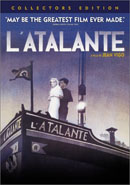Movies |
L’Atalante
By
Published: Oct 30, 2023
Category:
Drama
This is on almost every major critic’s list of the “best 100 movies of all time.” I’ve never seen it ranked lower than #15. After Renoir’s “Rules of the Game,” it’s the highest ranked French film. And I’d bet most of you have never heard of it.
The movie was made in winter. And on the river. Jean Vigo was already suffering from tuberculosis. Now he got so sick he sometimes had to direct from a cot. His illness worsened when he finished the film, and, again, when it was released: the studio had hated the movie, re-cut it, added a popular song to the soundtrack, changed the title and slammed it into theaters — as an entertainment “inspired by” the song.
Thirty-four days after he handed “L’Atalante” over to the studio, Jean Vigo died. His distraught wife tried to join him in death by jumping out a window. Luckily, friends grabbed her in mid-stride. But she had it right: Jean Vigo’s death in 1934 was a tragedy. He had directed only a few films. He had just made a great movie. More were surely ordained. But there it was. Death. At 29.
The film in question is now on almost every critic’s list of the “best 100 movies of all time.” I’ve never seen it ranked lower than #15. After Renoir’s “Rules of the Game,” it’s the highest ranked French film. But although it was brilliantly restored in 1990, few Americans know about “L’Atalante.” Fewer have seen it. Watch the trailer.
The story is so simple you may wonder how Vigo filled 87 minutes with it. Jean is the young captain of L’Atalante, a barge that goes up and down the Seine. He marries Juliette, a country girl who has never left her village. Now she’s on a boat making its slow way to Paris. And she’s the only woman — the crew is a colorful old salt named Pere Jules and his son.
For someone as provincial as Juliette, married life and barge life are a double shock. When the barge reaches Paris, Jean and Juliette quarrel. She runs off. He can’t find her. They miss each other horribly — watch the intensity. They’re reunited. End of movie. [To rent the streaming video — with subtitles — of “L’Atalante” from Amazon, click here.]
Vigo inherited what looks like a banal story from the studio. He hired Boris Kaufman — who would later come to America and shoot “On the Waterfront” — as the cinematographer. And then he added the touches that make this film so extraordinary: the tenderness of the relationship set against the rough, documentary feel of life on the barge, the silvery beauty of the boat moving through fog, the almost surrealistic shots of Juliette in her wedding gown on the deck of the barge, the mesmerizing underwater sequence.
Truffaut nailed the achievement of this film when he said that, by filming ordinary people doing ordinary things, Vigo achieved poetry. I’d go further — he finds the poetry in ordinary people. The night Jean and Juliette are separated, for example. Vigo cuts back and forth, showing their loneliness — and, in a daring sequence, showing them caress themselves. It’s a powerful erotic moment. But its power comes from its universality, its commonness.
Why is “L’Atalante” so highly regarded? To see it is to know.
BONUS VIDEO
Francois Truffaut remembers the film.


